Growing Cannabis Outdoors in 2025
Growing Cannabis Outdoors – Guide by Cannapot
Updated: May 2025 | Outdoor Cannabis Cultivation
Author: Cannapot Grow Team | Reading time: 8 minutes
Introduction – Growing Cannabis Outdoors with Ease
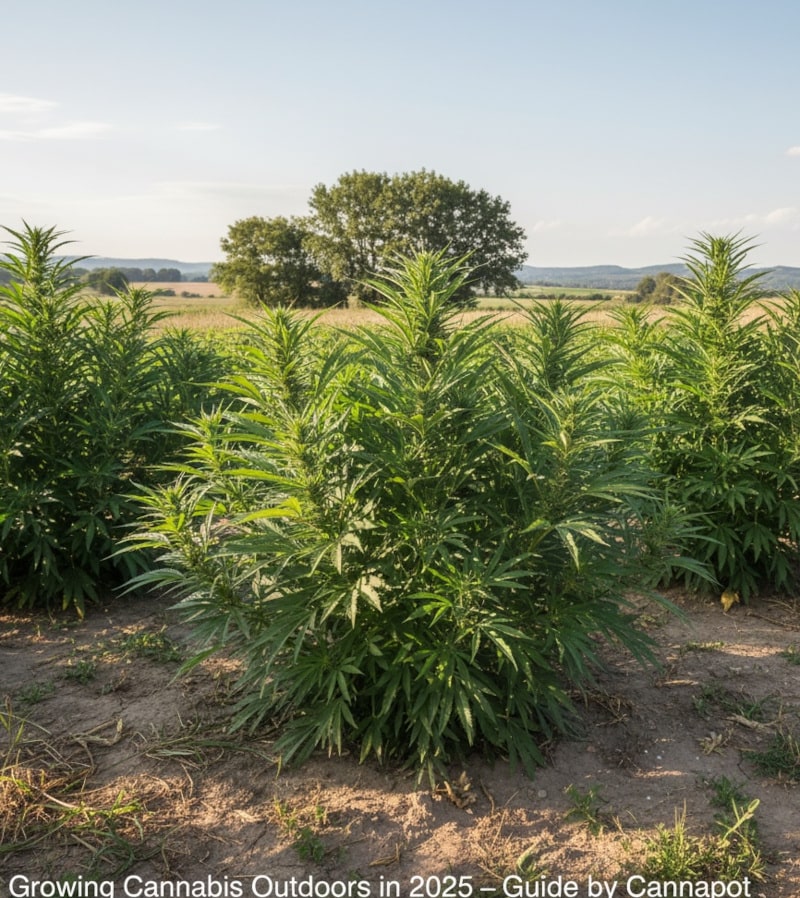
Many growers prefer the outdoors because the sun does most of the work. With more than twenty years of experience in European cannabis genetics, Cannapot offers a guide that covers each step carefully.
This text walks through everything that matters. The growing laws, the best seed types for your climate, watering, harvesting, and how to avoid common mistakes. Each section builds from practical use and what has worked for real people.
Expert Tip:
Growing outdoors always depends on where you live, how long the days last, and what type of plant you select. These details matter more than the calendar itself.
Legal Situation in Germany
Since April 2024, it has become legal in Germany to grow cannabis at home under controlled conditions. Adults may grow up to three plants for personal use. The seeds must come from legal European sources. Selling or displaying the plants publicly is not allowed.
Always check your local state laws before starting. Some regions may differ in how they handle visibility or plant count.
Cannapot only offers seeds that follow European regulations. Each shipment is sent discreetly and safely.
Why People Choose to Grow Outdoors
Outdoor cultivation allows the plant to grow under the same sky it came from. It is a simple and natural way to let the plant follow its rhythm. Sunlight offers the full light range that helps flavor and scent form properly.
Benefits of Outdoor Growing
-
No need for artificial light or ventilation
-
Room for larger root growth
-
Natural soil improves taste and strength
-
Less cost and lower maintenance
Expert Tip:
A plant grown under open light and healthy soil often gives a deeper smell and stronger branch growth compared to an indoor one.
Choosing the Right Seeds
Every region grows differently. Picking the right seed type decides how smooth your grow will be. Some plants need long summers, others prefer quick cycles.
Seed Categories
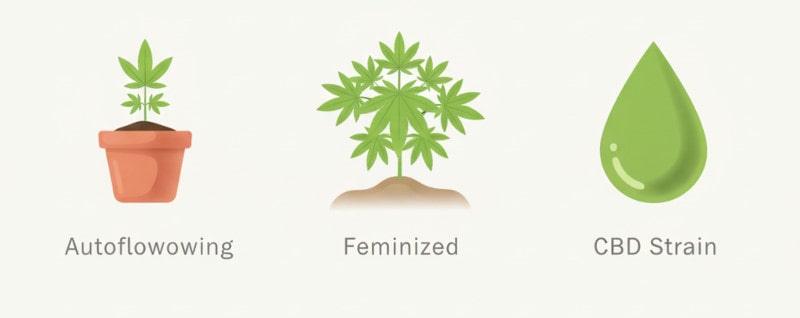
|
Type |
Main Traits |
Where It Grows Best |
Time to Harvest |
|
Short, quick, simple |
Northern and Central Europe |
8–12 weeks |
|
|
Feminized |
Large plants, full harvest |
Central and Southern Europe |
5–6 months |
|
Mild effect, gentle on body |
All European climates |
10–12 weeks |
Expert Tip:
Autoflowering strains such as Auto Amnesia or Auto Critical work well for beginners. They grow fast and finish before the autumn rain begins.
Climate and Region Differences
|
Region |
Weather Pattern |
Recommended Seeds |
Advice |
|
Northern Germany |
Cool and humid |
Early autoflowers |
Start indoors, protect from mold |
|
Central Germany |
Mild and balanced |
Most autoflowers and feminized seeds |
Three to four cycles per year possible |
|
Southern Germany and Austria |
Warm and dry |
Sativas, Indicas and mixed hybrids |
Long season, larger harvest window |
Expert Tip:
When night temperatures drop below twelve degrees in late September, choose a quick strain that finishes early. Alpenhigh strains are also perfectly suited to withstand even the most adverse environmental conditions – Alpenhigh genetics are extremely weather-resistant and of absolutely superb quality.
Preparing and Gathering Equipment
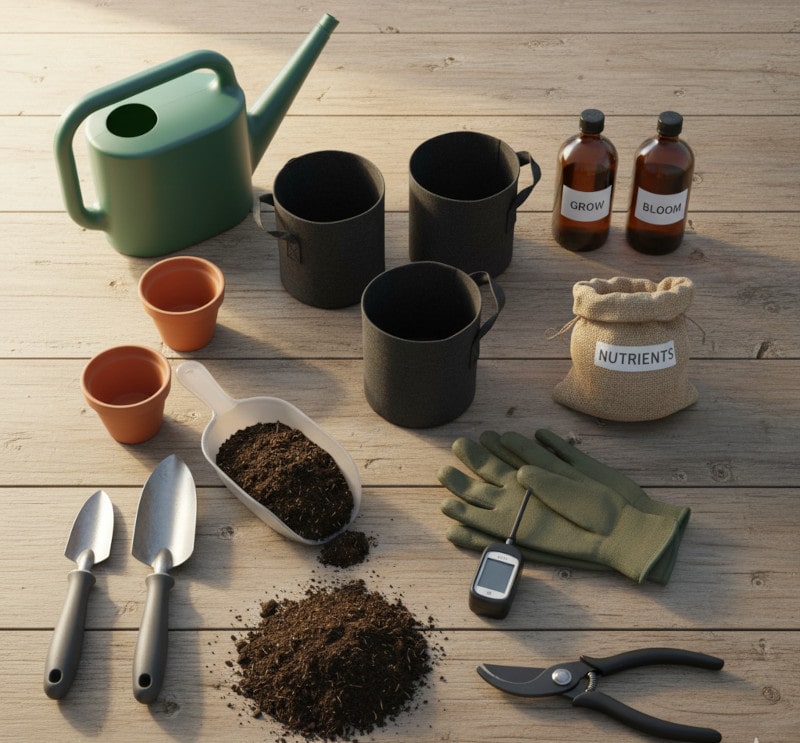
Basic Tools
-
Quality cannabis seeds
Small pots for seedlings
Light soil mix
Spray bottle for gentle watering
Helpful Additions
-
pH meter
Organic nutrient bottles
Wooden or bamboo supports
Light pest netting
Expert Tip:
Keep soil pH between six and seven. Incorrect pH is the most common reason plants stop absorbing nutrients properly.
Finding a Good Location
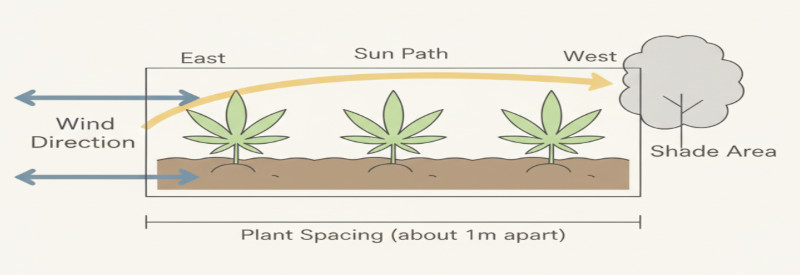
Look for a place with enough sun, fresh air, and privacy. The ground should not stay wet after rain.
Ideal Conditions
-
Six to eight hours of direct light
-
Shelter from heavy wind
-
Soil that drains well
-
Hidden from public view
When to Plant
-
Autoflowering seeds: March to August
-
Feminized and regular seeds: April to May
Expert Tip:
South-facing gardens or balconies provide longer sunlight hours. Some growers place white boards or reflective sheets nearby to boost light exposure.
Germination and Sowing
-
Prepare Seeds – Place in warm water for about one day.
-
Paper Method – Move to damp paper towels for two to five days.
-
Watch for Roots – A small white root means the seed is ready to plant.
-
Plant Carefully – Keep temperature between twenty-two and twenty-five degrees and humidity near seventy percent.
|
Tool |
Use |
|
Small pots |
For early root growth |
|
Soft soil |
Prevents compacting |
|
Heat mat |
Keeps steady warmth |
Expert Tip:
Place the seed directly into its final container if possible. Transplanting can slow growth in autoflowering plants.
Growth Stages

|
Stage |
Time |
What Happens |
|
Vegetative |
Four to eight weeks |
Growth and leaves |
|
Transition |
One to two weeks |
Early signs of flowering |
|
Flowering |
Six to ten weeks |
Buds form and fill out |
|
Harvest |
One to two weeks |
Cutting and drying |
Water early in the day. The soil should feel damp but not soaked. Push your finger about two centimeters deep. If it feels dry, water again. Rainwater is fine as long as it is clean.
Expert Tip:
Mix a handful of perlite into your soil before planting. It helps air move through the roots and keeps water from sitting too long.
Feeding
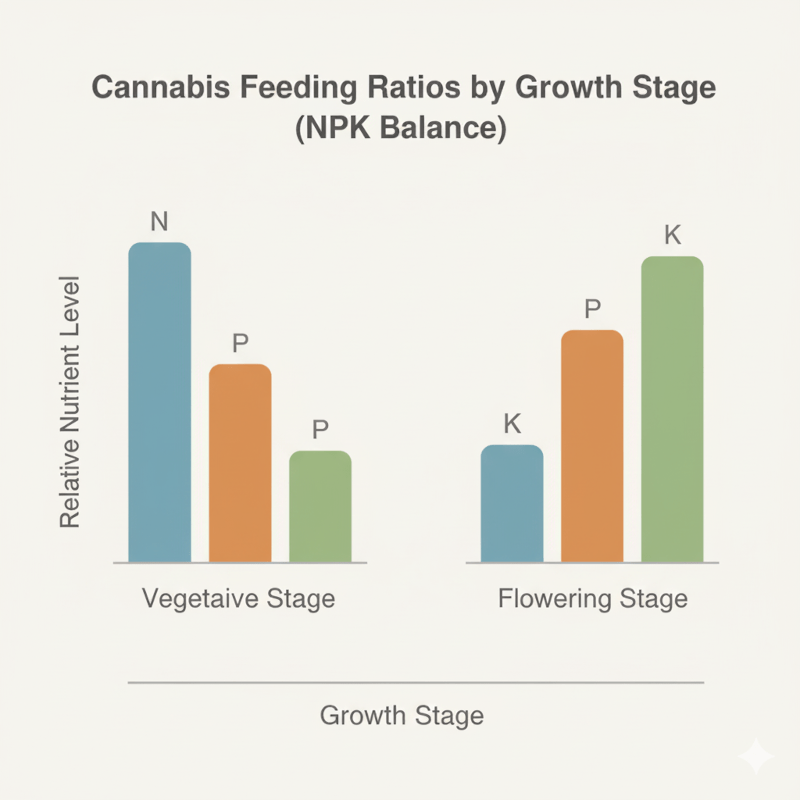
|
Stage |
Nitrogen |
Phosphorus |
Potassium |
|
Vegetative |
High |
Medium |
Medium |
|
Flowering |
Low |
High |
High |
Start slow with feeding. Too much nutrient burns the tips and slows everything down. Change to bloom feed once you see small flowers forming. Stop feeding two weeks before harvest and just use clean water.
Expert Tip:
Organic fertilizer such as worm compost or bat guano adds a clean taste and steady strength to the buds.
Dealing with Pests and Problems
|
Problem |
Signs |
What to Do |
|
Aphids |
Sticky leaves |
Neem oil or ladybugs |
|
Spider Mites |
Tiny webs and dots |
Spray water and raise humidity |
|
Thrips |
Silver marks on leaves |
Use sticky traps |
|
Mold |
White fuzz on buds |
Trim leaves and add airflow |
Expert Tip:
A light neem oil spray every ten days can stop most insects before they start
Knowing When to Harvest
This part takes patience. The buds look done before they are.
You will know they are ready when:
-
Most trichomes look cloudy under a magnifier
-
The hairs turn brown and curl in
-
The smell becomes deeper and sticky
-
The lower leaves start to fade
Use a small magnifier, about thirty times zoom, to check closely.
Expert Tip:
Early morning is the best time to cut. The air is cool and the buds hold more aroma before the sun warms them.
Drying and Curing
Dry the branches slowly in a quiet, dark room. The air should move a little but not too much.
|
Setting |
Good Range |
|
Temperature |
18 to 20 degrees |
|
Humidity |
45 to 55 percent |
|
Light |
Dark room or dim light |
|
Airflow |
Gentle movement |
Hang them for about a week or two. When small stems snap instead of bending, you can move to jars. Open the jars once a day for a week to let air in, then every few days after that.
Expert Tip:
Longer curing brings smoother smoke. Waiting three or four weeks changes the smell in a good way.
Seasonal Plan
Autoflowering
|
Cycle |
Start |
Harvest |
Duration |
|
One |
March |
May |
10 to 12 weeks |
|
Two |
April |
July |
10 to 12 weeks |
|
Three |
June |
August |
8 to 10 weeks |
|
Four |
July |
September |
8 to 10 weeks |
Feminized or Regular
|
Step |
Period |
|
Sowing |
March or April |
|
Growth |
May to July |
|
Flowering |
August to September |
|
Harvest |
October to November |
Expert Tip:
Autoflowers can be done four times a year if the weather stays kind. Feminized ones take longer but usually grow bigger and heavier.
Why People Buy from Cannapot
Cannapot have more than seven thousand strains in the shop. The team has worked with breeders for over twenty years. Orders stay private, and seeds come from trusted European sources. The germination rate is high, and help is always there if needed.
The idea is simple. Sell good seeds, treat people fairly, and let the plants do the rest.
Final Thoughts
Outdoor growing teaches patience. You wait, you water, you watch the weather, and one day the buds are ready. It is quiet work, but it feels real.
Expert Tip:
Keep a small notebook. Write when you plant, when it rains, how the plant smells. It helps more than you would think next year.
Start Growing
You can check the outdoor section at Cannapot for strains that match your area. Everything ships from within the European Union, packed carefully and without any fuss.
